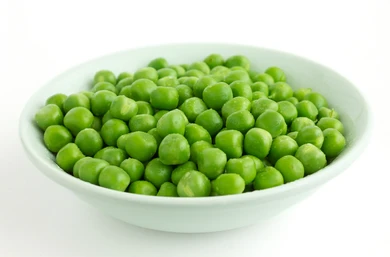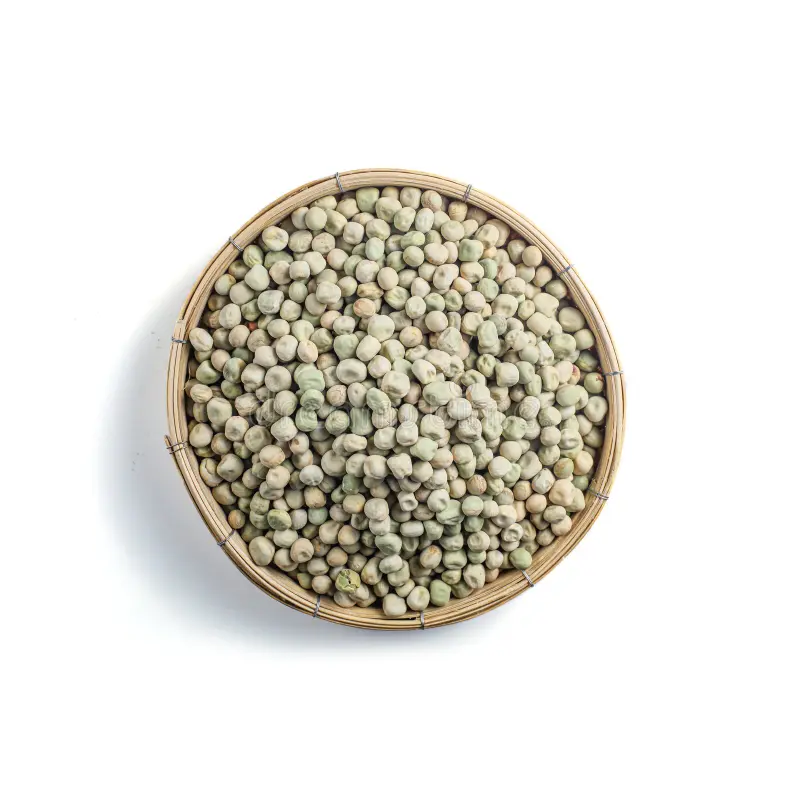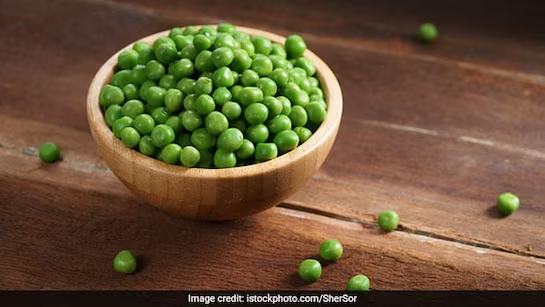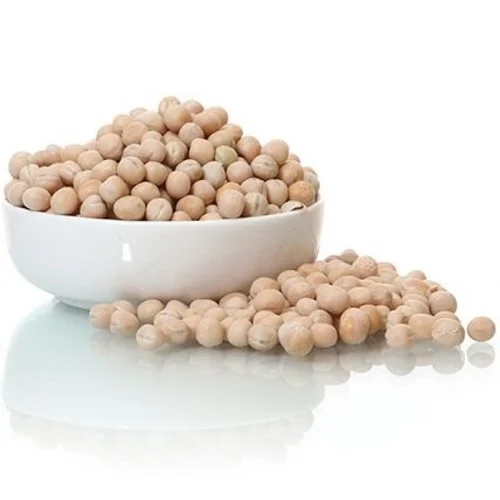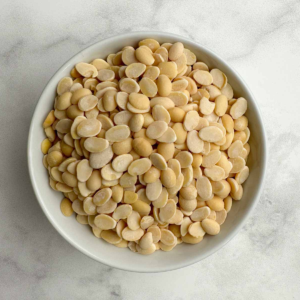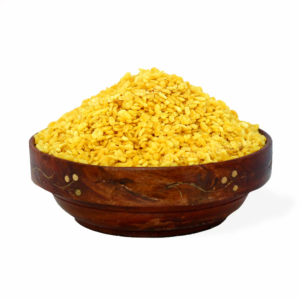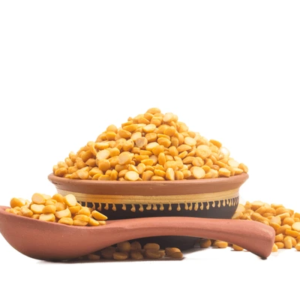Description
Green peas are small, round, and vibrant green legumes harvested from the Pisum sativum plant. They are typically consumed fresh or frozen and are one of the most common vegetables worldwide. White peas (or yellow peas) are the dried version of the same plant, and they tend to be beige or yellowish in color. Both varieties are packed with essential nutrients, making them an important food source in many diets.
- Green Peas (Matar): These peas are harvested while still young and tender and are typically consumed fresh, frozen, or canned. They are slightly sweet and tender when cooked and are used in a variety of dishes.
- White Peas (Yellow Peas): These peas are allowed to mature fully before being harvested and then dried. They are more starchy and earthy in flavor and are commonly used in soups, stews, and curries.
Nutritional Profile of White & Green Peas (Matar):
Peas are low in fat but high in protein, fiber, and micronutrients. A 1-cup serving (approximately 160 grams) of cooked green peas contains:
- Calories: About 120-140 calories, depending on preparation method.
- Protein: Approximately 8 grams of protein, making peas a valuable source of plant-based protein.
- Carbohydrates: Around 20-25 grams of carbohydrates, including 6-7 grams of dietary fiber. This makes peas a good source of slow-digesting carbohydrates.
- Vitamins: Peas are rich in Vitamin K, Vitamin C, and several B-vitamins, including folate (B9), thiamine (B1), and Vitamin B6. These vitamins play key roles in energy production, immune function, and maintaining healthy skin, nerves, and red blood cells.
- Minerals: Peas provide essential minerals such as iron, magnesium, potassium, and phosphorus. They also contain some calcium, which supports bone health.
- Antioxidants: Green peas are a rich source of antioxidants, including flavonoids, carotenoids, and Vitamin C, which help reduce inflammation and protect against oxidative damage.
Health Benefits of White & Green Peas (Matar):
1. High in Plant-Based Protein:
Both white and green peas are excellent sources of plant-based protein, which is essential for building and repairing tissues, producing enzymes and hormones, and supporting immune function. With approximately 8 grams of protein per cup, peas are an ideal protein source for vegetarians, vegans, and those looking to reduce their meat consumption.
2. Promotes Digestive Health:
Peas are rich in dietary fiber, which supports digestive health by adding bulk to stool and promoting regular bowel movements. Fiber also helps prevent constipation, supports gut health, and reduces the risk of developing digestive disorders such as diverticulosis and hemorrhoids. The fiber in peas also feeds beneficial gut bacteria, contributing to a healthy gut microbiome.
3. Supports Heart Health:
Peas contain fiber, potassium, and antioxidants that contribute to heart health. The high fiber content helps lower cholesterol levels, reducing the risk of heart disease. Potassium helps regulate blood pressure, and antioxidants protect against oxidative damage that could lead to cardiovascular problems.
4. Stabilizes Blood Sugar Levels:
Peas have a low glycemic index, which means they release glucose into the bloodstream slowly, helping to stabilize blood sugar levels. This makes peas a beneficial food for people with diabetes or those looking to prevent blood sugar spikes. The fiber in peas also aids in regulating blood sugar by slowing digestion.
5. Helps with Weight Management:
Peas are low in fat and calories but high in protein and fiber, which help promote feelings of fullness and reduce hunger. Including peas in meals can help control calorie intake and reduce overall food consumption, making them a valuable addition to a weight management or weight loss plan.
6. Rich in Antioxidants:
Green peas are loaded with antioxidants, including Vitamin C, flavonoids, carotenoids, and polyphenols. These compounds help neutralize free radicals in the body, reduce inflammation, and protect against chronic diseases such as cancer, heart disease, and neurodegenerative conditions. Antioxidants also promote healthy skin by reducing the effects of aging and environmental damage.
7. Supports Bone Health:
Peas contain several minerals essential for bone health, including calcium, magnesium, and phosphorus. These minerals help maintain bone density, prevent osteoporosis, and support overall bone strength. The Vitamin K in peas also plays an important role in bone health by helping with calcium absorption and bone mineralization.
8. Improves Immune Function:
The high content of Vitamin C and other antioxidants in peas helps boost the immune system by promoting the production of white blood cells and fighting off infections. Regular consumption of peas may help the body defend itself against common illnesses such as colds and flu.
9. Supports Eye Health:
Peas are rich in carotenoids, particularly lutein and zeaxanthin, which are known to support eye health. These antioxidants help protect the eyes from harmful UV rays and blue light, reducing the risk of age-related macular degeneration (AMD) and cataracts.
10. Detoxifies the Body:
Peas are often considered a detoxifying food due to their high fiber content, which aids in flushing out toxins from the digestive system. They also contain compounds that help support liver function and detoxification processes in the body.
How to Use White & Green Peas (Matar):
- Curries and Stews: Both green and white peas are often used in curries, stews, and soups. Green peas are a common ingredient in vegetable curries, while white peas (yellow peas) are frequently used in traditional dishes like Matar Paneer (peas and paneer curry) and Yellow Pea Soup.
- Salads: Green peas can be added to salads, providing a crunchy and sweet flavor. They can be used in both cold and warm salads, combined with other vegetables, herbs, and dressings.
- Rice Dishes: Green peas are often added to rice dishes such as Pulao or Pilaf, giving the dish a pop of color and added nutrition. In Indian cuisine, peas are commonly included in Vegetable Biryani.
- Frozen Snacks: Green peas can be roasted or fried with spices to make a crunchy and flavorful snack. These snacks are commonly enjoyed as appetizers or street food in various countries.
- Vegetable Fritters: Mung peas can be used in fritters or pakoras, a popular snack in Indian cuisine. The peas are coated in a seasoned chickpea flour batter and deep-fried to create crispy bites.
- Smoothies: Fresh or frozen green peas can be blended into smoothies for a boost of protein, fiber, and nutrients. Adding peas to a smoothie can provide a creamy texture while adding a mild sweetness.
- Matar Paratha: A popular Indian flatbread filled with spiced green peas and then cooked on a griddle. This is a great way to enjoy peas in a savory dish.
- Pasta and Sauces: Green peas can be tossed into pasta dishes, soups, and sauces for added nutrition and flavor. They pair well with creamy pasta sauces, pesto, and tomato-based sauces.
- Pea Soup: Green and white peas can be pureed to make a hearty, creamy pea soup. Adding garlic, onions, and herbs can enhance the flavor of this simple dish.
Considerations:
- Allergies: While peas are generally considered safe for most people, they can cause allergic reactions in some individuals, particularly those who are allergic to other legumes. Symptoms of an allergy may include swelling, itching, and difficulty breathing. If allergic reactions occur, seek medical attention immediately.
- Storage: Fresh peas should be stored in the refrigerator and used within a few days for optimal freshness. Frozen peas can be stored for longer periods and used as needed. Dried white peas should be stored in an airtight container in a cool, dry place.
In Summary:
White and green peas (Matar) are nutritious legumes that offer a range of health benefits. Packed with protein, fiber, vitamins, and antioxidants, they support digestive health, heart health, immune function, and overall well-being. They are versatile in the kitchen and can be used in a variety of dishes, from curries and soups to salads and snacks. Whether fresh, frozen, or dried, peas are an excellent addition to any diet and can provide essential nutrients while helping to promote long-term health.


